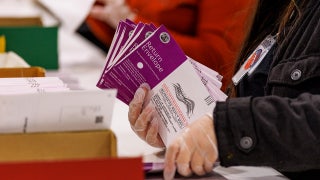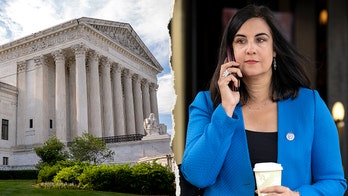It's a strange election year. There are dueling messages from the electorate on a collision course in Congress, and though they are not mutually exclusive, they might as well be, as reconciling the two would prove a near impossible political feat in the current partisan environment.
Democrats know the more the American people stare at a stubbornly unmoving, sky high unemployment figure, that shifts only slightly at times, the more they will be punished at the polls come November - if the past is truly prologue.
The path to victory in the fall, as previous elections have taught, usually heads straight through a voter's pocketbook/wallet.
BUT - as the nation careened toward a staggeringly high $13 trillion in debt, a figure surpassed just last month, up popped the Tea Party and other conservative groups like Club for Growth with a clear "stop the deficit spending" message.
Incumbent Republican-turned Dem Sen. Arlen Specter of Pennsylvania fell under the weight of that message, as did Sen. Robert Bennett, R-UT, a conservative stalwart, crushed by a wave of anger in a GOP convention-nominating process, particularly for supporting the federal government bailout of the financial industry.
So is the message 'create more jobs'? Or is it 'stop the red ink'? A bipartisan amalgam would seem a likely solution, but not in this kind of bitter environment.
Democrats pushed forward with a $115 billion piece of legislation they're calling a "jobs bill" that extends unemployment benefits, green energy tax credits, small business and infrastructure assistance from the stimulus bill, and more. Read about it here.
It's a bill whose price tag is steadily rising with Democrats adding federal assistance to the states for Medicaid spending.
Dems insist that the so-called "extenders" bill, which was voted out of the House last month and is now on the Senate floor, will create jobs and that will, in turn, have a positive effect on the economy.
Sen. Chuck Schumer, D-NY, a member of leadership told reporters Tuesday morning, "Make no mistake about it, this is a jobs bill."
It is a foregone conclusion that there will be no second stimulus bill, so Dems are hanging their "jobs" sign around just about any piece of legislation that could spur job growth.
The extenders bill helps small businesses, eliminating fees for small biz loans, for instance, and attempts to close tax loopholes that allow multi-national companies to shelter earnings abroad free of U.S. taxes.
Schumer said the small business components of the bill that come out of the stimulus bill, of which the loan fee elimination is a part, has "already created 650,000 jobs" and will create more.
Sen Jeff Merkley, D-OR, who joined Schumer at a press conference, also cited green energy tax credits, extended from previous law, as a jobs creator.
Senate Finance Committee Chairman Max Baucus, D-MT, on Tuesday, citing some areas of his own state with a staggering 16.8% unemployment rate, said the infrastructure spending in the bill will help create jobs, as well.
"We've come a long way...even if you exclude temporary Census jobs. The first five months of this year, the economy has created nearly half a million new jobs, but we still have a lot more to do," the chairman recounted.
But Republicans hit back with the criticism that not only are Democrats running up the federal tab by creating jobs that will not be sustained with a focus too much on government jobs (411,000 of the 433,000 jobs created in May were Census jobs), but their policies are creating an environment that is hostile to job creation.
"The actions that the government has taken over the last year during this great recession too often make it harder to create jobs in the private sector," Sen. Lamar Alexander, R-TN, said Monday, "The health care bill taxes job creators and investors. Those are the ones who create the jobs. The stimulus package runs up the debt. The higher the debt goes, the more money it sucks out of the system and the harder it is to get money and the harder it is to create jobs."
"This is...so-called jobs bill...it's a bill which will cost $116 billion. It will add $54 billion to our national debt and will further weaken the private sector's ability to create jobs," Sen. Jon Kyl, R-AZ, noted Monday.
Republicans are insisting that any "extenders" bill be paid for, and GOP sources say that will be a message that will be carried consistently into the fall elections.
Many Republicans favor the vast majority of this bill, and Schumer predicted today that Dems would get the votes next week for final passage. But in a move that could spell trouble ahead for Democrats as they try to muster the 60 votes they will need for passage, moderate Sen. Scott Brown, R-MA, issued a statement Monday saying he is opposed to the bill as written.
"We need to stop the deficit spending that is putting future generations of Americans in a deep financial hole. We are borrowing against our next generation. Washington must start offsetting the cost of worthy programs by cutting wasteful spending in other places," Brown said.












































